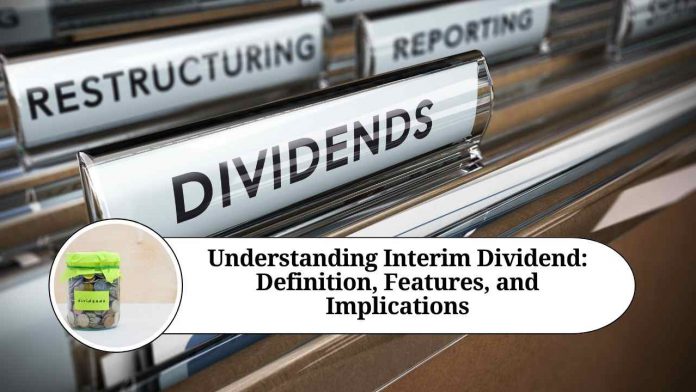Dividends are one of the most important ways in which companies reward their shareholders. They represent a portion of a company’s profits that are distributed among its shareholders. Dividends can be paid out regularly or occasionally, depending on the company’s financial performance and other factors. One type of dividend that companies may pay is an interim dividend. In this blog, we will define what an interim dividend is, discuss its features, and analyze its implications.
What is an Interim Dividend?
An interim dividend is a dividend paid by a company to its shareholders in the middle of its financial year, before the end of the fiscal year. It is a partial distribution of profits made by the company, which is paid out to shareholders before the company’s final financial statements are prepared. Interim dividends are typically paid out when the company has excess cash flow or profits, and the board of directors wants to reward shareholders for their investment.
Features of Interim Dividend
- Timing: Interim dividends are paid out in the middle of the financial year, usually after the company’s first or second quarter results have been released. They are paid out before the company’s final financial statements are prepared.
- Amount: Interim dividends are typically smaller than final dividends. The amount of interim dividend paid out by a company is determined by the board of directors, based on the company’s cash flow, profits, and financial position.
- Frequency: Interim dividends are not paid out regularly. They are paid out only when the company’s board of directors deems it appropriate to reward shareholders for their investment.
Implications of Interim Dividend
- Positive Signaling: Interim dividends can be seen as a positive signal to the market, indicating that the company is performing well and has excess cash flow. This can lead to an increase in the company’s stock price, as investors perceive it as a good investment opportunity.
- Tax Implications: Interim dividends are subject to tax in the same way as final dividends. However, since they are paid out earlier in the year, they may have a different tax treatment than final dividends. Shareholders should consult with their tax advisors to understand the tax implications of interim dividends.
- Liquidity: Interim dividends can provide shareholders with additional liquidity, allowing them to reinvest the funds or use them for other purposes. This can be particularly useful for long-term investors who do not want to wait until the end of the financial year to receive a return on their investment.
Conclusion
Interim dividends are a way for companies to reward their shareholders for their investment in the middle of the financial year. They are typically smaller than final dividends and are paid out when the company has excess cash flow or profits. Interim dividends can be a positive signal to the market, provide shareholders with additional liquidity, and have tax implications. As with any investment decision, investors should carefully consider the implications of interim dividends before investing in a company’s stock.
Read more useful content:
Frequently Asked Questions (FAQs)
Q: What is an interim dividend?
A: An interim dividend is a dividend paid by a company to its shareholders in the middle of its financial year, before the end of the fiscal year. It is a partial distribution of profits made by the company, which is paid out to shareholders before the company’s final financial statements are prepared.
Q: When are interim dividends paid out?
A: Interim dividends are typically paid out in the middle of the financial year, usually after the company’s first or second quarter results have been released. They are paid out before the company’s final financial statements are prepared.
Q: What is the difference between an interim dividend and a final dividend?
A: The main difference between an interim dividend and a final dividend is the timing of their payment. Interim dividends are paid out in the middle of the financial year, while final dividends are paid out at the end of the financial year. Interim dividends are typically smaller than final dividends, and their amount is determined by the board of directors based on the company’s cash flow, profits, and financial position.
Q: What is the purpose of an interim dividend?
A: The purpose of an interim dividend is to reward shareholders for their investment in the company. It is typically paid out when the company has excess cash flow or profits and the board of directors wants to distribute a portion of these profits to shareholders.
Q: Are interim dividends subject to tax?
A: Yes, interim dividends are subject to tax in the same way as final dividends. However, since they are paid out earlier in the year, they may have a different tax treatment than final dividends. Shareholders should consult with their tax advisors to understand the tax implications of interim dividends.
Q: Are interim dividends paid out regularly?
A: No, interim dividends are not paid out regularly. They are paid out only when the company’s board of directors deems it appropriate to reward shareholders for their investment.
Q: What are the implications of interim dividends for investors?
A: Interim dividends can be a positive signal to the market, indicating that the company is performing well and has excess cash flow. This can lead to an increase in the company’s stock price, as investors perceive it as a good investment opportunity. Interim dividends can also provide shareholders with additional liquidity, allowing them to reinvest the funds or use them for other purposes. However, investors should carefully consider the implications of interim dividends before investing in a company’s stock, including the tax implications and the company’s financial position.




















